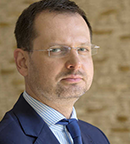As reported in The Lancet Oncology by Dominik Dytfeld, MD, PhD, and colleagues, an unplanned interim analysis of the phase III ATLAS trial has shown improved progression-free survival with carfilzomib, lenalidomide, and dexamethasone (KRd) vs lenalidomide alone as maintenance after autologous stem cell transplantation (SCT) in newly diagnosed patients with multiple myeloma. The current analysis was triggered by the occurrence of 61% of expected events for the primary analysis, and the findings are considered preliminary.

Dominik Dytfeld, MD, PhD
Study Details
In the investigator-initiated open-label trial, 180 patients from sites in the United States and Poland were randomly assigned between June 2016 and October 2020 to receive KRd (n = 93) or lenalidomide alone (n = 87). Patients had completed any type of induction therapy and had stable disease or better and underwent autologous SCT within 100 days. Patients received 28-day cycles of treatment for up to 36 cycles, with both groups receiving lenalidomide maintenance after 36 cycles.
KRd consisted of:
- Carfilzomib at 20 mg/m² on days 1 and 2 in cycle 1; at 36 mg/m² on days 1, 2, 8, 9, 15, and 16 in cycles 1 to 4; and at 36 mg/m² on days 1, 2, 15, and 16 in cycles 5 to 36
- Lenalidomide at 25 mg on days 1 to 21
- Dexamethasone at 20 mg on days 1, 8, 15, and 22.
Lenalidomide alone consisted of 10 mg daily for the first three cycles and then at the best tolerated dose up to 15 mg thereafter.
Patients in the KRd group with no detectable measurable residual disease after cycle 6 and standard-risk cytogenetics were switched to lenalidomide maintenance as of cycle 9. The primary endpoint was progression-free survival in the intention-to-treat population.
Progression-Free Survival
Median follow-up was 33.8 months (interquartile range = 20.9–42.9 months). A total of 35 patients in the KRd group with no detectable measurable residual disease after cycle 6 and standard-risk cytogenetics switched to lenalidomide maintenance at cycle 9. Median progression-free survival was 59.1 months (95% confidence interval [CI] = 54.8 months to not estimable) in the KRd group vs 41.4 months (95% CI = 33.2–65.4 months) in the lenalidomide alone group (hazard ratio [HR] = 0.51, 95% CI = 0.31–0.86, P = .012).
In a post hoc subgroup analysis in 72 vs 69 patients with standard-risk cytogenetics, KRd was associated with significantly improved progression-free survival. Medians were not reached (95% CI = 54.8 months to not estimable) vs 65.4 months (95% CI = 33.2–65.4 months), with a hazard ratio of 0.37 (95% CI = 0.20–0.70).
No significant difference in overall survival was observed, with death occurring in 10% vs 13% of patients (HR = 0.83, 95% CI = 0.35–2.00, P = .68). Complete response or better was observed in 76% vs 71% of patients.
KEY POINTS
- In an unplanned interim analysis, maintenance KRd improved progression-free survival vs lenalidomide alone following autologous SCT.
- Median progression-free survival was 59.1 months vs 41.4 months.
Adverse Events
Grade 3 or 4 adverse events occurred in 76% of patients in the KRd group vs 73% of those in the lenalidomide group; the most common were neutropenia (48% vs 60%), thrombocytopenia (13% vs 7%), and lower respiratory tract infection (8% vs 1%). Serious adverse events occurred in 30% vs 22% of patients, most commonly lower respiratory tract infection in both groups (12% vs 3%). Adverse events led to treatment discontinuation in 4% vs 12% of patients. Treatment-related death occurred in one patient in the KRd group, due to respiratory failure from severe pneumonia. Second primary malignancies occurred in one and two patients, respectively.
The investigators concluded, “This interim analysis provides support for considering carfilzomib, lenalidomide, and dexamethasone therapy in patients with newly diagnosed multiple myeloma who completed any induction regimen followed by autologous SCT, which requires confirmation after longer follow-up of this ongoing phase III trial.”
Andrzej J. Jakubowiak, PhD, of the University of Chicago Medical Center, is the corresponding author for The Lancet Oncology article.
Disclosure: The study was funded by Amgen and Celgene (Bristol Myers Squibb). For full disclosures of the study authors, visit thelancet.com.

